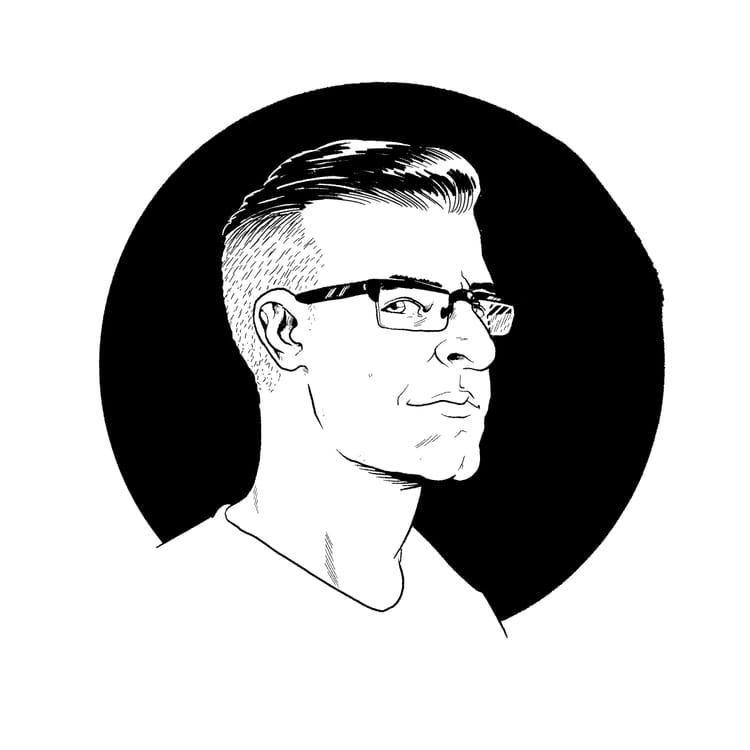As Simple As Vanishing
Disappearing the first time was easy.
When Maurice decided that he wanted to vanish that first time, all he had to do was try. He walked away and he didn't look back, and he found that the people he passed moved out of his way without looking at his face. No one called after him. No one frowned when he brushed against them too closely. He jumped the turnstile to get on the train, and he dangled his feet off the edge of the platform and watched the rats on the tracks, and he put his hands into people’s coat pockets, and not a single person said a word about it.
It wasn’t until he stopped trying to be invisible that it wore off. He decided that he was ready to be visible again, so he ordered a coffee. Somewhere between “hi, I’d like a” and “large,” the barista startled and clapped her hand to her sternum. She apologized, said she didn’t know where her head had been, said she didn’t know how it was that she hadn’t seen him there.
But Maurice knew.
It had been easy. He had gone invisible, and no one from his old life had even seen him go.
He hadn’t expected it to be as simple as deciding. Or maybe he hadn’t expected the decision to be as simple as turning invisible.
#
The second time, disappearing was harder. Maurice tried to vanish the same way that he had before, but there was a complication. He had made a friend. This was a real friend, as it turned out, not that Maurice had realized the difference between a real friend and a convenient friend. Not until it was too late. Rowan had become a real friend, and when Maurice decided that it was time to vanish again, Rowan’s eyes followed the shimmer in the air where he walked.
It took a whole month for Maurice to shake Rowan off the trail, a month of unanswered text messages and missed drinks dates. But also, a month was all it took, and then Rowan’s memories of Maurice faded like a ships’ wake disappearing into the sea. Maurice felt it happen: the harder he concentrated on the work of not missing Rowan, the easier it was for him to be forgotten. It took a whole month, but it worked in the end.
A new city. A new life. Maurice ordered a coffee, and he let people see him, and he thought that this time, he would stay. This time, he would make friends like Rowan, and he would be brave enough to keep them. This time, he wouldn’t decide to walk away from everyone.
This time would be different.
#
The third time, disappearing was almost impossible. It had been so many years that Maurice had made the mistake of putting down roots, and when he tried to turn invisible, he almost failed. He’d nearly forgotten the trick of it, and some part of him thought that maybe it would be good to forget the trick of it, and so he screwed it up. His feet didn’t transluce the way they were supposed to, and he didn’t notice until it was almost too late. His coworker, Dana, noticed the disembodied feet heading for the door, and she yelped.
Maybe, he thought, Dana would think that she was just going cross-eyed from all the wireframe mock-ups she’d been staring at that day. Maybe she wouldn’t recognize his wingtips. All the way home, Maurice stared at his traitorous feet, reminding himself that this was necessary. It was for the best. He had to disappear. By the time he got off the bus, he had almost convinced himself. By the time he got to his apartment building, his name was already fading from the label next to his buzzer.
The next day, there were a flurry of messages from coworkers and friends: where are you, what happened, are you okay? Maurice bit the second knuckle of his ring finger hard. Not hard enough to draw blood — it’s not so easy to draw blood with something as weak as teeth — but hard enough to leave a crooked set of indentations that would bruise the next day.
He ignored the text messages. He ignored them the same way he always ignored the impulse to look over his shoulder as he walked from one life to another. It was hard, after so much time, but he told himself that this was the only way.
It worked. It put an ache in his throat, concentrating that hard on the work of not missing anyone, but it worked. The messages didn’t continue, and when he went to check his email that evening, the account had been deactivated. He walked out of the front door of his apartment the next morning, leaving his key in the lock. His furniture faded behind him, leaving only a crooked set of indentations in the carpet.
#
Maurice stayed invisible for as long as he needed to. Five times, or six; it was always hard for him to remember, because he couldn’t think too much about the times before. If he did, things would go wrong. He would lose control, and he would let himself miss Rowan, or Dana, or the way the late-afternoon sun used to hit his desk, or the color he painted the kitchen. When that happened — when he let himself wonder whether turning invisible is worth the cost of not looking back — his phone would begin to vibrate in his pocket. He knew, every time, what was happening. It felt exactly like waking up with a hangover, and knowing which drink was the one that had done him in.
When that happened, Maurice could not look at his phone. If he did, he would see text messages and emails and missed phone calls from people who had suddenly found themselves wondering whatever happened to their friend Maurice, that guy who sat next to them at work for a few years, that date they had fun on and then never seemed to remember to call again? They would all be asking how he’d been, what he’d been up to, if they could get together the next time he’s in town.
It would be too much. The first time it happened, he almost lost control completely. He almost called one of them back. It had been a disaster, narrowly averted when his phone overheated from the volume of incoming notifications. The phone had shut itself off, and by the time it was able to turn back on again, Maurice had gotten hold of himself. It took an hour, his fingernails dug deep into his arms, his breath slow and ragged.
He regained control. When he turned his phone back on, the notifications and voicemails had disappeared.
He never looked anymore, not when the buzzing started like that. Not when he could feel the shame of knowing that people were missing him. He never looked until he was certain that he could count on what he would see.
#
Maurice stands at the counter at the coffeeshop, the old trick to snap himself out of invisibility. He’s in a new city. He’s ready to start again.
He tells the barista that he’d like a large iced coffee, but she doesn’t answer.
He says it again, louder. The woman behind him orders, talking right over him, and the barista smiles and writes the woman’s name on a coffee cup. Maurice orders again and again, orders for half an hour, orders while the barista writes other people’s names on cups and flirts with her coworkers and sends a text message under the counter, her eyes darting around the coffeeshop to make sure no one notices.
No one notices. No one except Maurice.
He is not panicking yet. Not yet, not so much, only a little, in his throat and his wrists. He whispers into the ear of a laptop-hunched young man. He whispers his own name, and then his mother’s name, and then the names of his sisters, and then the names of everyone he’s left behind. The young man stays hunched.
Now, the panic begins to uncurl, low in his belly and rising fast. He removes his phone from his pocket, and the screen is blank. His key ring is empty; his wallet has cash in it, but his ID and credit cards have disappeared, too. Nothing with his name on it exists.
Those things have never disappeared before. He does not know how to bring them back. He does not know how to undo it, not this time.
No one ever told him that invisibility could stick.
He sits in the middle of the sidewalk, waiting for the panic to subside. The streets are full, and people walk around him, looking at each other and at the sky and at the street.
Maurice watches the people who do not see him, and he knows that he is finally gone.







Member discussion